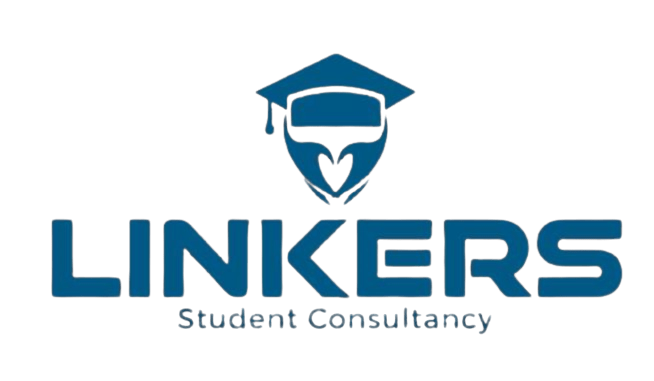Choosing the right academic program can be a life-changing decision, shaping your career and personal development for years to come. With the vast array of options available, from traditional universities to specialized training centers, and the complexity of admissions processes, many prospective students find the decision-making process overwhelming. This is where education consultancies like Linkers Education come into play.
Linkers Education offers a wealth of experience and expertise in guiding students to make informed choices that align with their career aspirations, personal interests, and financial circumstances. In this comprehensive guide, we’ll delve into the key factors to consider when choosing an academic program, highlight the services provided by Linkers Education, and explore the benefits of working with a consultancy.

Understanding Your Goals and Interests
1. Self-Assessment
Before you begin exploring your academic options, it’s crucial to conduct a thorough self-assessment. Understanding your interests, strengths, and career aspirations can significantly narrow down your choices and ensure that you select a program that aligns with your personal and professional goals.
- Identify Your Interests: Reflect on subjects and activities that genuinely engage you. Consider your hobbies, past academic subjects you enjoyed, and any topics you are passionate about.
- Assess Your Strengths: Evaluate your skills and strengths. Are you good at analytical thinking, creative problem-solving, or working with people? Recognizing your strengths can help identify fields where you are likely to excel.
- Career Aspirations: Think about your long-term career goals. Do you envision yourself in a particular profession, industry, or role? Understanding your career aspirations can guide you toward programs that offer relevant skills and knowledge.
2. Long-Term Goals
Your choice of academic program should align with your long-term goals. Consider the following:
- Career Opportunities: Research the career prospects associated with different programs. Look into job demand, potential salary, and growth opportunities in your desired field.
- Geographical Preferences: Determine where you want to study and work. Some programs are highly regarded in specific regions, and studying in a particular location might provide networking opportunities and industry connections.
- Lifestyle Considerations: Think about the kind of lifestyle you want. For example, a career in medicine may require long hours and dedication, while a career in the arts might offer more flexibility.
Exploring Your Options
1. Types of Academic Programs
Different types of academic programs cater to various interests and career paths. Here are some options to consider:
- Traditional Degree Programs: These include undergraduate and graduate degrees offered by universities and colleges. They provide a broad education and are often necessary for careers in fields such as law, medicine, and academia.
- Vocational Training: Vocational or technical programs offer specialized training in specific trades or professions, such as plumbing, electrical work, or culinary arts. These programs are typically shorter and more focused on practical skills.
- Online Courses and Certifications: Online programs offer flexibility and convenience. They are ideal for working professionals or those who prefer to study at their own pace. Certifications can enhance your skills in a specific area and improve your employability.
- Short-Term Workshops and Bootcamps: These intensive programs are designed to provide skills in a short period. They are popular in tech fields, where you can learn coding, data science, or digital marketing in a few months.
2. Researching Institutions and Programs
Once you have an idea of the type of program you’re interested in, it’s time to research institutions and specific programs. Consider the following:
- Accreditation: Ensure the institution and program are accredited by relevant authorities. Accreditation ensures that the program meets specific standards of quality and that your degree will be recognized by employers and other institutions.
- Reputation and Rankings: Look at the reputation and rankings of the institution and program. While rankings should not be the sole deciding factor, they can provide an indication of the quality of education and resources available.
- Curriculum and Faculty: Review the curriculum to ensure it covers topics relevant to your interests and career goals. Research the faculty to learn about their expertise and background.
- Student Support Services: Consider the support services available, such as career counseling, internships, and mentoring programs. These services can enhance your learning experience and provide valuable career support.

Financial Considerations
1. Cost of Education
The cost of education is a significant factor in choosing a program. Consider tuition fees, accommodation, books, and other expenses. Research scholarships, grants, and financial aid options to help offset the cost.
- Tuition Fees: Compare the tuition fees of different institutions and programs. Remember that more expensive does not always mean better, and many affordable programs offer excellent education.
- Living Expenses: Consider the cost of living in the area where you will be studying. Urban areas tend to have higher living costs than rural areas.
- Financial Aid: Research scholarships, grants, and student loans. Many institutions offer financial aid packages to help students afford their education.
2. Return on Investment
Consider the potential return on investment (ROI) of your education. Look into the average starting salaries and career growth opportunities in your chosen field. A higher initial cost may be justified if it leads to better job prospects and higher earning potential.
- Salary Prospects: Research the average salaries for graduates of different programs. Consider the long-term earning potential in your chosen field.
- Career Advancement: Evaluate the opportunities for career advancement and professional growth. Some fields may offer rapid advancement, while others may have slower career progression.
Application Process
1. Preparing Your Application
The application process can be competitive and complex. Start early and ensure you meet all the requirements.
- Application Requirements: Review the application requirements for each program. This may include transcripts, letters of recommendation, personal statements, and standardized test scores.
- Personal Statement: Write a compelling personal statement that highlights your interests, goals, and why you are a good fit for the program. Tailor your statement to each program to show your genuine interest and alignment with their values.
- Letters of Recommendation: Request letters of recommendation from individuals who know you well and can speak to your abilities and potential. Provide them with sufficient time and information to write a strong letter.
- Standardized Tests: Prepare for any required standardized tests, such as the SAT, GRE, or GMAT. Use practice tests and study guides to improve your scores.
2. Navigating the Admissions Process
Stay organized and keep track of deadlines. Submit your applications on time and follow up with any additional requirements.
- Application Deadlines: Keep track of application deadlines for each program. Missing a deadline can disqualify you from consideration.
- Follow-Up: After submitting your application, follow up with the institution to ensure all documents have been received and your application is complete.
- Interviews: Prepare for any required interviews. Practice common interview questions and be ready to discuss your goals and interests in detail.
Working with Linkers Education
1. The Role of an Education Consultancy
Education consultancies like Linkers Education provide invaluable support throughout the process of choosing and applying to academic programs. They offer personalized guidance, expert advice, and a range of services to help you make the best decisions.
- Personalized Guidance: Linkers Education offers tailored advice based on your interests, strengths, and career goals. They help you explore options and make informed decisions.
- Expert Advice: With extensive experience and knowledge of the education system, consultants can provide insights into different programs and institutions, helping you choose the right one.
- Comprehensive Services: From initial assessment to application support and interview preparation, Linkers Education offers a range of services to support you at every step.
2. Benefits of Using Linkers Education
Working with an education consultancy can offer several benefits:
- Access to Information: Consultants have access to a wealth of information about different programs and institutions, helping you make informed choices.
- Streamlined Process: They can help streamline the application process, ensuring you meet deadlines and submit a complete and competitive application.
- Increased Chances of Admission: With their expertise, consultants can help you enhance your application and improve your chances of admission to your desired program.

Conclusion
Choosing the right academic program is a significant decision that can impact your future career and personal development. By understanding your goals and interests, exploring your options, considering financial aspects, and navigating the application process, you can make an informed decision. Working with an education consultancy like Linkers Education can provide valuable support and guidance, helping you achieve your educational and career aspirations.





